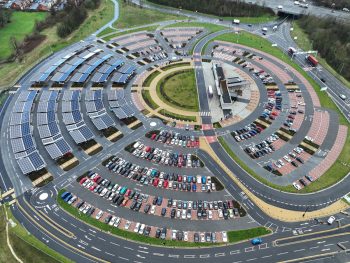Solar powered park and ride for Leeds City Council
Leeds City Council has opened the UK’s first solar powered Park and Ride in Stourton, serviced by electric buses that link the Park and Ride to Leeds city centre.

Leeds City Council has opened the UK’s first solar powered Park and Ride in Stourton
Stourton is Leeds’ third Park and Ride site and the first that is powered by solar modules coupled with a battery storage system, with carbon emissions being reduced by approximately 471,000 KGCO2e in 2022.
The project comprises a 1.2MWp SolarEdge solar system, smart EV charging infrastructure and a 950kWh battery that allows solar to power the site outside of daylight hours. The system is expected to generate 852,000 kWh of electricity a year. The PV panels are located on carport canopies that also provide shelter above parking spaces. Solar energy generated by the system also powers the depot’s lighting, CCTV, and heating in the waiting room.
The project is a key part of Leeds City Council’s strategy to hit carbon zero by 2030 and reduce congestion and pollution in the city centre. The initiative was partially funded by the Department for Transport and a grant awarded by the European Regional Development Fund. With the battery storage in place, around 12% of the energy produced by the site will be exported to the grid, with the remainder stored and used to help power the facility outside of daylight hours. By load shifting using the battery, grid import to the site is expected to be zero for most of the time.
Solar installer, Evo Energy chose a SolarEdge DC-optimised system to compliment the curved solar arrays, where string inverters would have struggled to overcome energy loss due to module-level mismatch, and meet Leeds City Council’s energy generation targets and module level remote monitoring requirements. Each pair of solar modules is connected to a SolarEdge Power Optimiser that enables each module to operate at its maximum efficiency, thus minimising the effect of any shading, uneven panel degradation or heavy soiling. Traditional strings would restrict the module performance to the output of the lowest-performing module on the string. This means that energy production will be higher in future years too, as solar modules age at different rates, exaggerating the string effect.
“This project is a sustainable example for other cities in the UK to follow. This site highlights how a project can positively impact a community, the local economy, and businesses throughout the city by enabling renewable energy powered transportation and enhancing the volume of transport links. It’s a great step forward in sustainable electrification of transport, while overcoming local grid limitations and the essential need for smart energy solutions,” said Jonathan Roper, principal renewable energy consultant, EvoEnergy.












